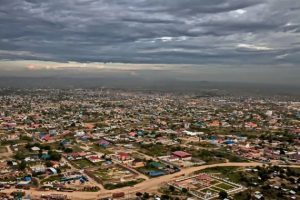Warnings & Dangers in Sudan

OVERALL RISK : MEDIUM
Sudan is a reasonably safe country to travel in its region. If you follow certain precautions and use common sense, you can avoid serious problems while traveling in this country.

TRANSPORT & TAXIS RISK : MEDIUM
Traveling by public transport in Sudan is not recommended, as transport may not be reliable. In addition, the state of transport in Sudan is often in poor condition. Taxi is quite safe if you use licensed services.

PICKPOCKETS RISK : HIGH
Pickpockets are common in Sudan. Therefore, tourists are advised never to leave their things unattended. It is essential to keep an eye on your bags, be attentive to your surroundings. In public places, at train stations and bazaars, keep bags and wallets tightly near you.

NATURAL DISASTERS RISK : LOW
In Sudan, natural hazards such as floods and droughts are vital contributors to the displacement of populations, food insecurity, and other related humanitarian concerns – leaving much of the country's population in a highly vulnerable state.

MUGGING RISK : MEDIUM
Severe attacks and kidnappings are possible only in remote areas of the country, in border and conflict zones. Travel only in tourist places. Do not walk around the city late at night and carefully lock your home.

TERRORISM RISK : HIGH
The risk of terrorism in Sudan is quite high. Terrorist acts, as well as kidnapping, are highly probable in the Darfur region. Do not travel to this region and the surroundings bordering South Sudan. Always be aware of your surroundings.

SCAMS RISK : MEDIUM
The primary type of fraud in Sudan is an attempt to deceive tourists when someone disguises as a police officer and demands a bribe. Also, avoid withdrawing money from an ATM outside banks. Often in such ATMs, your card data is read.

WOMEN TRAVELERS RISK : MEDIUM
Women traveling alone should take enhanced measures of their safety. You need to dress modestly and not draw attention to yourself with loud conversations or behavior. Try not to be on the streets at night.
How Safe Is Sudan for Tourists?
Sudan is not the safest place to travel; however, taking precautions you can do without serious risks.
The crime index ranges from low to high.
The main problems are related to hacking and car thefts, robberies, as well as a high level of bribery and corruption.
Locals are quite hospitable and always happy to help tourists without requiring money for help.
Robberies and thefts do occur, but most people will do anything to ensure their well-being.
There are conflicts and corruption in the government in Sudan, although most Sudanese are honest.
Tensions remain between Sudan and South Sudan; it is better not to go to the border zones.
Over the past few years, a petty crime against foreigners has increased (the theft of telephones, bags, and robberies for cash).
Keep track of your belongings (hide smartphones, etc.) in public places such as street cafes.
However, personal experience shows that this is one of the safest African countries to visit.
Traveling for a single woman is usually safe.
Remember that Sudan is an Islamic country and dress accordingly.
However, do not use public transport alone and be careful in crowded places and at bus stops.
Do I Need a Visa to Visit Sudan?
Visitors to Sudan must obtain a visa from one of the Sudanese diplomatic missions unless they come from one of the visa-exempt countries. All visitors must hold passports valid for a minimum of six months from the arrival date.
Which Currency Is Used in Sudan?
The Sudanese pound is the basic unit of the Republic of Sudan. The pound consists of 100 piasters. The Central Bank of Sudan issues the pound. Its value is linked to gold and convertible into foreign currencies.
How's the Weather like in Sudan?
The best time to visit Sudan is from January until March, July and August, and October until December when you will have a warm till very hot temperature and none till limited rainfall. The highest average temperature in Sudan is 42 °C in May and the lowest is 32 °C in January.
What Do I Need to Know about Airports in Sudan?
Khartoum International Airport is the principal airport in Khartoum, the capital of Sudan. Khartoum airport is situated in the heart of the capital and serving as the country’s main gateway to the world.
Should I Get Travel Insurance for My Travels?
Just like anywhere else, the travel insurance policy is a must when visiting a foreign country. Make sure you got it before starting your journey, the customs officer may ask for it.
What Are Some Things to Do in Sudan?
Most of Sudan’s territory is occupied by a plateau (300-1000 meters high), which crosses the Nile River valley from south to north, formed by the confluence of the White and Blue Nile. The confluence area is the capital of the country, the city of Khartoum. All rivers belong to the Nile basin. Tourists in Sudan come to see the National Museum of Sudan, Jebel Barkal, and Nuri Pyramids.
Is the Water in Sudan Safe to Drink?
Sudan is a country that is half desert, and much of the population suffers from a shortage of clean drinking water as well as a reliable source of water for agriculture. Tap water isn’t drinkable.
Is Uber Safe in Sudan?
There is no Uber service in South Sudan. But you can use any other taxi services in this country.

